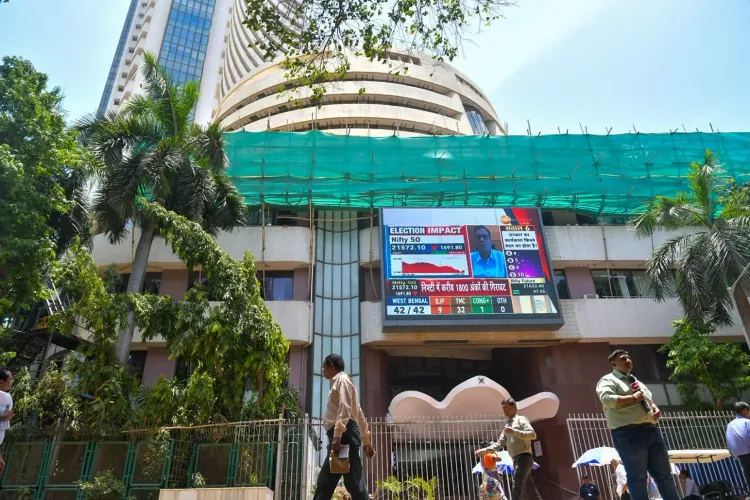Why Did Sensex and Nifty Open Lower Amid US Trade Policy Uncertainty?

Synopsis
Key Takeaways
- Indian equity indices opened lower due to US trade uncertainty.
- Sensex down 212 points; Nifty down 49 points.
- Midcap and smallcap stocks showed marginal buying.
- Banking and financials outperforming in a weak market.
- FIIs were significant sellers, while DIIs were net buyers.
Mumbai, July 14 (NationPress) The Indian equity indices started the day on a lower note on Monday, primarily due to the ongoing uncertainty surrounding US trade policies and a mixture of global market signals.
As of 9:19 am, the Sensex had dropped by 212 points, or 0.24 percent, settling at 82,301, while the Nifty fell by 49 points, or 0.20 percent, to reach 25,104.
However, there was some marginal buying activity observed in midcap and smallcap stocks. The Nifty midcap 100 index rose by 94 points, or 0.16 percent, reaching 58,736, and the Nifty smallcap 100 index increased by 25 points, or 0.14 percent, to 18,788.
Analysts highlight that the Nifty has been demonstrating a weak performance, largely influenced by the decline in IT stocks.
“This trend of weakness may continue, especially since Foreign Institutional Investors (FIIs) were significant sellers in the cash market last Friday,” noted VK Vijayakumar, Chief Investment Strategist at Geojit Investments Ltd.
It's noteworthy that banking and financial stocks are showing resilience even in this challenging market environment.
“This trend could persist. The market has already priced in the Net Interest Margin (NIM) compression for banking stocks anticipated in Q1 results. Thus, declines in banking stocks may present buying opportunities,” he added.
In terms of sector performance, auto, PSU banks, metals, real estate, and energy sectors are in the green, while IT, financial services, pharmaceuticals, FMCG, media, and infrastructure are experiencing significant losses.
In the Sensex pack, top gainers included Trent, Power Grid, Sun Pharma, Titan, NTPC, Maruti Suzuki, Axis Bank, M&M, SBI, and Tata Steel.
Conversely, the major losers comprised Bajaj Finance, Infosys, Bajaj Finserv, Tech Mahindra, Bharti Airtel, L&T, HCL Tech, Tata Motors, Kotak Mahindra Bank, and HUL.
On the institutional front, FIIs were net sellers of equities worth Rs 5,104 crore on July 11, while Domestic Institutional Investors (DIIs) were net buyers, investing Rs 3,558 crore.
Many Asia-Pacific markets are trading in a mixed fashion as investors respond to renewed trade tensions.
The announcement of a 30 percent tariff on imports from the European Union and Mexico, effective August 1 by US President Donald Trump, has unsettled markets. The EU has postponed its 30 percent retaliatory tariffs against the US to facilitate further discussions.









